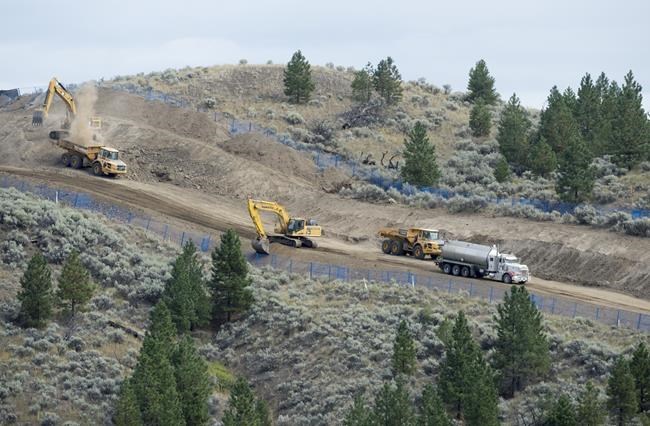CALGARY — Limited and slow access to capital is a major barrier to First Nations' ability to take ownership roles in the resource megaprojects being built across their lands, a panel of Indigenous business leaders said Tuesday.
The three panellists said they view ownership of oil and gas, pipeline and transmission line projects as essential to provide prosperity for their people, while also protecting their environment and culture, during a webcast discussion sponsored by the Macdonald-Laurier Institute,.
"These developments are going to happen, they're going to happen on our territories, we want a say in how they're going to happen and we want to be able to benefit from the projects," said Mark Podlasly, director of economic policy and initiatives for the 65-member First Nations Major Projects Coalition.
First Nations don't own their land under the Indian Act and can't use it as collateral to obtain funding in the millions or billions of dollars needed to invest in big projects, he said, adding that makes it difficult to negotiate ongoing benefits to communities from the project developers.
"The big change that's happened over the past 20 years is that First Nations are now looking to provide capital as investment into these projects, where we become shareholders and equity holders and enjoy in the revenue streams," he said.
Many Indigenous people are reluctant to support land ownership reform because they fear losing control of the land, said Podlasly, a member of the Cooks Ferry First Nation in B.C.,
Crystal Smith, elected chief councillor for the Haisla Nation Council in Kitimat, B.C., says her community decided to support LNG Canada and the Coastal GasLink pipeline to bring natural gas from northern B.C. to the facility after years of watching projects being built nearby that provided little local benefit.
"We have a vision for our people and it comes from being a participant in projects ... Our vision is to improve the quality of lives of our people today and for future generations," she said.
Coastal GasLink has been supported by all 20 elected band councils along the pipeline route. Hereditary chiefs who led opposition to the pipeline signed an agreement in May in which the federal and B.C. governments recognized their rights and title.
Access to capital is one of the reasons to support Project Reconciliation, an Indigenous consortium considering making a bid to buy majority ownership of the Trans Mountain pipeline from the federal government, said founder Delbert Wapass on the panel.
"Our First Nations have the opportunity to collectively participate in large infrastructure projects, be it green, real estate, or whatever they look like, but we have to be capitalized to maximize our bargaining ability with industry and government," said the former chief of Saskatchewan's Thunderchild First Nation.
"And we feel if we have the model correct, and First Nations can move at the speed of business without relying on outside sources of funding, we can realize these opportunities and begin managing wealth as opposed to continuously managing poverty."
Project Reconciliation is proposing ownership of at least 51 per cent of the pipeline be shared among about 340 Indigenous communities in B.C., Alberta and Saskatchewan.
The group would put 80 per cent of the cash flow from the pipeline stake into a "sovereign wealth fund'' to invest in environmentally friendly projects.
Its bid is in competition with the Western Indigenous Pipeline Group which argues Trans Mountain should be owned by communities actually located on the route as they are most at risk from an oil spill.
This report by The Canadian Press was first published Sept. 29, 2020.
Dan Healing, The Canadian Press




